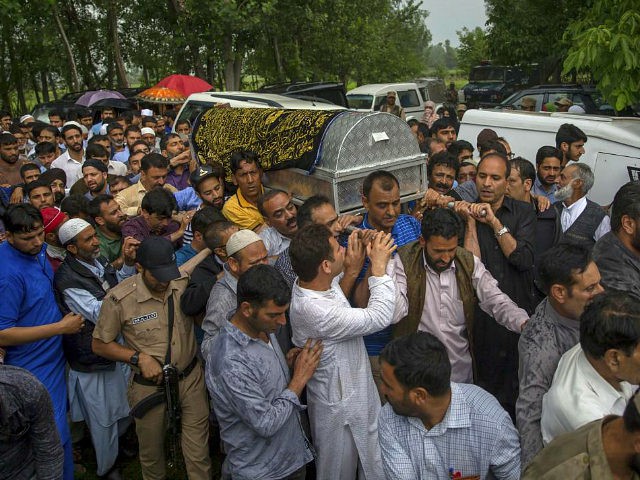52-year-old journalist Shujaat Bukhari — founder and editor of the English-language daily paper Rising Kashmir — was reportedly murdered by three motorcycle-riding gunmen outside his office in the city center of Lal Chowk on Thursday evening.
Bukhari had just climbed into his car when the assailants drove up and fired several shots at close range, killing the journalist and the two armed police officers assigned to protect him. Bukhari has been given police protection ever since a prior assassination attempt in 2002. He was also abducted by gunmen in 2006, surviving only because the gun jammed when his kidnappers tried to execute him.
NDTV notes that one of Bukhari’s last publications was a Twitter post mourning the killing of policemen in southern Kashmir. “Violence must stop to create a space for dialogue,” he wrote.
Bukhari had participated in peace talks between India and Pakistan over the disputed Kashmir region. Just a few hours before his murder, he supported a call by the U.N. human rights office to investigate abuses committed by both Indian and Pakistani forces in Kashmir.
Bukhari, a Muslim, was on his way to a dinner commemorating the end of Ramadan when he was killed. Extremist groups in Kashmir have denounced a ceasefire meant to coincide with Ramadan; if anything, militants stepped up violent attacks throughout the month.
Four suspects were soon arrested in connection with Bukhari’s assassination, one of them a man named Zubair Qayoom who was caught on camera checking the dead bodies inside Bukhari’s car after the shooting and absconding with a gun. The police have not confirmed Qayoom is a suspect in the murders as opposed to a passerby who pillaged the crime scene, but they said he has not given “convincing answers” to their questions.
Police officials said they believed Pakistan-based terrorist organization Lashkar-e-Taiba was behind the attack, describing it as a planned assassination that “would not be possible without local support.” The killers took pains to hide their faces and avoid cameras when perpetrating the attack.
“Hundreds of mourners in Kashmir today joined the funeral procession of Mr. Bukhari at his ancestral village Kreeri in Baramulla. Despite heavy rain, crowds of villagers, friends, and colleagues followed the procession through the streets of the village,” NDTV reported on Friday.
Writing at the New York Times on Thursday, reporter Sameer Yasir – a heartbroken protege of Bukhari who passed him on the street only half an hour before he was killed – recalled him as a “mentor and friend who never failed us,” a courageous journalist who was not intimidated by either militant gangs or the Indian government:
He covered every cease-fire between India and Pakistan with optimism, even though they all inevitably failed. He wrote about the tens of thousands of civilians who have been killed in Kashmir’s violence, the many mass graves that fill our countryside, the protests and the rare glimmers of hope.
No one was spared in Mr. Bukhari’s journalism, which meticulously documented Kashmir’s plight. He took on everyone: the violent militants who promote separatism and the Indian and Pakistani armies that shell each other from the swaths of the province they both occupy.
Mr. Bukhari was no stranger to threats. The bodyguards he drove with Thursday evening were assigned to him a decade and a half ago, after militant attempts on his life.
Working as a journalist in Kashmir is like walking on a razor’s edge. It is like being born again, every day, surprised to be alive before you go out into the field to risk reporting once more.
“No one knows which side of the conflict your journalism may offend, or which sentence may mean a bullet in the head like Mr. Bukhari received,” Yasir mournfully concluded.
Another veteran Kashmir reporter, Barkha Dutt, wrote at the Washington Post that Bukhari was “targeted for being a rare voice of moderation and reason in a public discourse bulldozed by ideological extremes.”
Dutt recalled Bukhari warning that an entire Kashmiri generation is “growing up hating India” but condemning secessionists as well:
Kashmiri secessionists targeted him for not being anti-India, while hyper-nationalists targeted him for not being patriotic.
On the day that he was killed, a video was shared by his critics on social media. In it, he was painted as an Islamist during a conference organized by a prominent think tank in Delhi, simply for refusing to support the publication of the Charlie Hebdo cartoons.
Bukhari (who was not present when the remarks were made) responded calmly to the “diatribe” on Twitter, writing, “In Kashmir we have done journalism with pride and will continue to highlight what happens on the ground.”
By the end of the day he was dead.
Dutt hoped that Bukhari’s death could serve as a wake-up call for the harassment, intimidation, and violence faced by journalists in India, warning that “press freedom as we have known it is distinctly diminishing.”

COMMENTS
Please let us know if you're having issues with commenting.